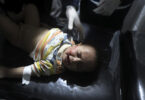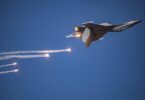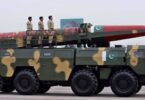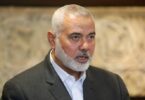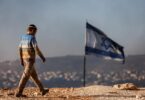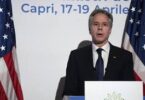MOSCOW (AP): Britain’s top diplomat urged Russia on Thursday to defuse tensions over Ukraine and take the path of diplomacy even as thousands of Russian troops engaged in sweeping maneuvers in Belarus as part of a military buildup near Ukraine that has fueled Western fears of an invasion.
U.K. Foreign Secretary Liz Truss again warned Russia that attacking its neighbor would “have massive consequences and carry severe costs,” urging Moscow to abide by its international agreements that commit it to respecting Ukraine’s independence and sovereignty.
Seated across a table from Truss with a grim face, Russian Foreign Minister Sergey Lavrov set a stern tone for the talks, emphasizing that Moscow won’t accept Western lecturing.
“Ideological approaches, ultimatums and moralizing is a road to nowhere,” Lavrov said, noting that his talks with Truss marked the first meeting of the two countries’ top diplomats in more than four years. Russia-U.K. ties have been badly strained by the March 2018 poisoning of former Russian spy Sergei Skripal in England and other sources of tension.
Russia has concentrated more than 100,000 troops near Ukraine’s border and launched a series of military maneuvers in the region, but says it has no plans to invade the nation.
Moscow wants guarantees from the West that NATO won’t allow Ukraine and other former Soviet countries to join as members, and for the alliance to halt weapon deployments to Ukraine and roll back its forces from Eastern Europe. The U.S. and NATO flatly reject these demands.
During an exchange of icy comments after the British and Russian minister’s talks, Truss reaffirmed a strong call for Moscow to pull its troops back to their bases. Lavrov rejected the demand as inappropriate and pointed at British and NATO troop buildups in Eastern Europe.
“The demands to remove the Russian troops from the Russian territory cause regret,” Lavrov said. “We don’t want to threaten anyone. It’s us who are facing threats.”
He alleged that Western politicians were fanning tensions over Ukraine for domestic political purposes. Russia planned from the start to move its troops back after conducting mandeuvers, Lavrov said, and once it does, “the West will likely claim that it has forced Russia to deescalate.”
“It’s selling hot air,” he snapped.
Russia’s military buildup includes the deployment of troops on the territory of its ally Belarus for sweeping joint drills that entered a decisive phase Thursday. The Ukrainian capital is located about 75 miles (47 miles) south of the border with Belarus, and Western nations voiced worry that Russia could use Belarusian territory to invade Ukraine.
Russia and Ukraine have been locked in a bitter conflict since 2014, when protests drove Ukraine’s Kremlin-friendly leader from office, Moscow annexed Crimea and then backed a separatist insurgency in eastern Ukraine. The fighting between Russia-backed rebels and Ukrainian forces has killed over 14,000 people.
A 2015 peace deal brokered by France and Germany helped end full-scale hostilities, but frequent skirmishes have continued along the tense line of contact while efforts to negotiate a political settlement stalled. The Kremlin has accused Kyiv of sabotaging the peace agreement, and Ukrainian officials in recent weeks said that implementing it would hurt their country.
Foreign policy advisers from Germany, France, Russia and Ukraine, who met in Paris on Jan. 26 without scoring any visible progress, are scheduled to have another round of talks in Berlin on Thursday to try to reach a common interpretation of the 2015 agreement and plan further steps.
The talks in Berlin are part of renewed diplomatic efforts to resolve the biggest security crisis between Russia and the West since the Cold War. French President Emmanuel Macron visiting Moscow for more than five hours of talks Monday with Russian President Vladimir Putin before meeting with Ukrainian President Volodymyr Zelenskyy in Kyiv the next day.
Macron said Putin told him he wouldn’t initiate an escalation, but also acknowledged that it will take time to find a diplomatic solution.
German Chancellor Olaf Scholz plans to visit to Kyiv and Moscow on Feb. 14-15. He met Monday with U.S. President Joe Biden, who vowed that the Nord Stream 2 Russia-to-Germany gas pipeline would be blocked in the event of an invasion. Such a move against the pipeline, which has been completed but isn’t yet operating, would hurt Russia economically but also cause energy supply problems for Germany.
NATO also has stepped up the deployment of troops to bolster the alliance’s eastern flank.
The U.S. has begun to move the 2nd Cavalry Regiment’s stryker squadron from Vilseck, Germany, to Romania, which borders Ukraine. U.S. officials have said they would send about 1,000 NATO troops.
About 1,700 soldiers from the U.S. Army’s 82nd Airborne Division are being sent to Poland. About half of them have arrived, and more are expected to follow in coming days, Pentagon press secretary John Kirby said. Britain also has pledged to send 350 more troops to Poland and already has sent anti-tank weapons to Ukraine.
British Prime Minister Boris Johnson said Thursday after meeting in Brussels with NATO Secretary General Jens Stoltenberg that the Russian military buildup near Ukraine marks “the biggest security crisis that Europe has faced for decades.”
“I honestly don’t think a decision has yet been taken” by Russia about whether to invade Ukraine, adding that “Our intelligence, I’m afraid to say, remains grim.”
Stoltenberg echoed that, noting that “the number of Russian forces is going up, the warning time for a possible attack is going down.”
“NATO is not a threat to Russia, but we must be prepared for the worst,” he said.
Stoltenberg said he had sent a new letter to Moscow repeating the alliance’s invitation for more talks.
Johnson planned to meet later Thursday with British troops deployed to Poland.

